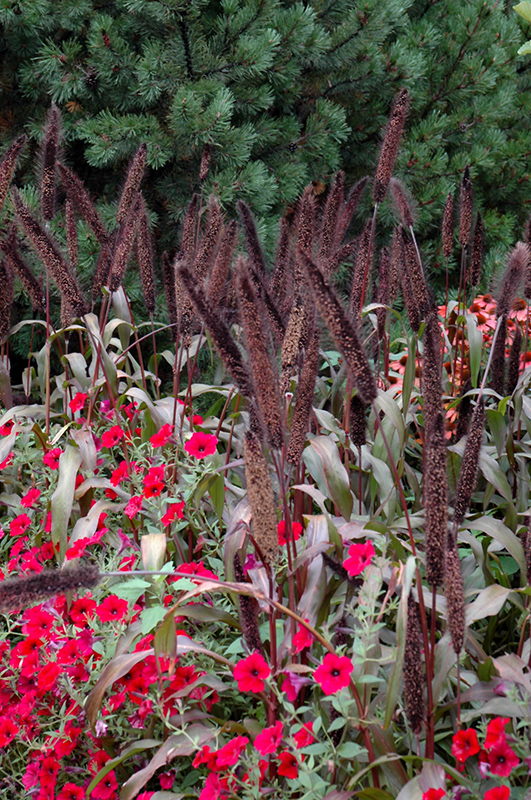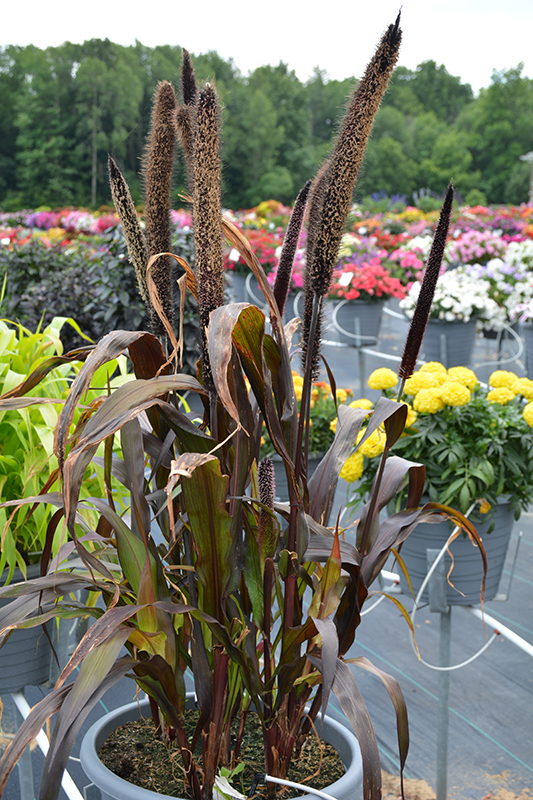Search Our Plants
Purple Baron Millet
Pennisetum 'Purple Baron'
Plant Height: 24 inches
Flower Height: 3 feet
Spacing: 18 inches
Sunlight:
![]()
Hardiness Zone: (annual)
Description:
A warm season annual grass selected for its boldy coarse foliage which starts out green turning dark purple-burgundy over the summer and showy burgundy seed heads that persist into winter for a dramatic effect; use as a garden accent
Ornamental Features
Purple Baron Millet features bold plumes of burgundy flowers rising above the foliage from early summer to early fall. The flowers are excellent for cutting. Its attractive large grassy leaves emerge green in spring, turning deep purple in color with showy burgundy variegation. As an added bonus, the foliage turns a gorgeous brick red in the fall. The tan seed heads are carried on showy plumes displayed in abundance from early fall to late winter.
Landscape Attributes
Purple Baron Millet is an herbaceous annual with a shapely form and gracefully arching foliage. Its relatively coarse texture can be used to stand it apart from other garden plants with finer foliage.
This is a relatively low maintenance plant, and is best cleaned up in early spring before it resumes active growth for the season. It is a good choice for attracting birds to your yard, but is not particularly attractive to deer who tend to leave it alone in favor of tastier treats. It has no significant negative characteristics.
Purple Baron Millet is recommended for the following landscape applications;
- Accent
- Mass Planting
- General Garden Use
- Container Planting
Planting & Growing
Purple Baron Millet will grow to be about 24 inches tall at maturity extending to 3 feet tall with the flowers, with a spread of 24 inches. When grown in masses or used as a bedding plant, individual plants should be spaced approximately 18 inches apart. This annual will normally live for one full growing season, needing replacement the following year.
This plant should only be grown in full sunlight. It is very adaptable to both dry and moist growing conditions, but will not tolerate any standing water. It is considered to be drought-tolerant, and thus makes an ideal choice for a low-water garden or xeriscape application. It is not particular as to soil type or pH. It is highly tolerant of urban pollution and will even thrive in inner city environments. This particular variety is an interspecific hybrid. It can be propagated by division; however, as a cultivated variety, be aware that it may be subject to certain restrictions or prohibitions on propagation.
Purple Baron Millet is a fine choice for the garden, but it is also a good selection for planting in outdoor pots and containers. Because of its height, it is often used as a 'thriller' in the 'spiller-thriller-filler' container combination; plant it near the center of the pot, surrounded by smaller plants and those that spill over the edges. It is even sizeable enough that it can be grown alone in a suitable container. Note that when growing plants in outdoor containers and baskets, they may require more frequent waterings than they would in the yard or garden.
This Plant Finder tool is an online catalog representing many of the varieties that we carry over the course of the season, and is intended for informational purposes only. Inventory varies seasonally, so we cannot guarantee that every plant will be in stock at all times - please contact your nearest Platt Hill Nursery store for current availability. It does not include our entire inventory of plants, so be sure to visit us to see varieties that may not be represented on this list.


